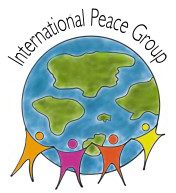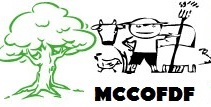Welcome to the Magarini Children’s Centre and Organic Demo Farm!
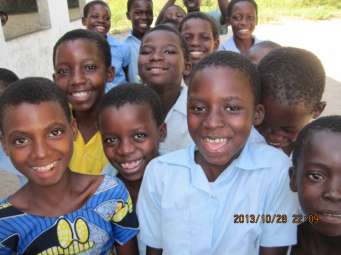 Magarini is a unique project that offers a home to vulnerable children and youth while at the same time working with the wider community to address the underlying problems of poverty, social breakdown and land degradation. By bringing people together to teach and learn organic farming, soil improvement, animal husbandry and reforestation we build a self-reliant community where people are empowered to create better livelihoods. Thus we strengthen community resilience and restore the land.
Magarini is a unique project that offers a home to vulnerable children and youth while at the same time working with the wider community to address the underlying problems of poverty, social breakdown and land degradation. By bringing people together to teach and learn organic farming, soil improvement, animal husbandry and reforestation we build a self-reliant community where people are empowered to create better livelihoods. Thus we strengthen community resilience and restore the land.
In only six years, we have seen so much positive change! Children left without care and protection can now access education and have hope for the future. In the wider community, both girls and boys are now going to school and being given equal opportunities. Child labour, child abuse and forced early marriages have been reduced thanks to our advocacy for children’s rights. Farmers are learning new skills in sustainable agriculture and becoming aware of the challenge of climate change. Perhaps the best of all, people are participating in community activities and taking initiative to solve their own problems!
OUR LOCATION
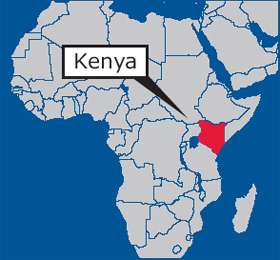
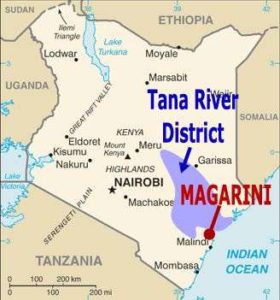
Magarini Children’s Centre is located in the Magarini District, Kilifi County, Kenya.
ABOUT US
Magarini Children’s Centre and Demo Farm is a registered Community-based Organization under Kenyan law. It was formed in 2008 as a community initiative to provide care and education to children who had lost their parents through HIV/AIDS as well as other homeless and vulnerable children in a region that struggles with extreme poverty. We currently accommodate forty orphans and sixty vulnerable and/or marginalized children and youth.
Beyond just providing immediate care to children in need, Magarini focuses on building a self-reliant community where people enjoy improved livelihoods through growing their own food while taking care of the soil, environment and nature for the benefit of the future generations.
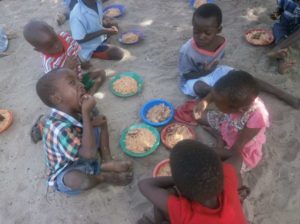 Our 8-hectares demonstration farm is a hub for community learning for thirty surrounding villages. Every Wednesday, three student farmers from each village come to tend the crops. As they learn and practice organic farming skills, they also learn how to integrate crops with care of pigs, poultry and goats, as well as fish-farming.Some of the harvested produce is sold to support the children’s programs, and the remainder is shared among the student farmers.
Our 8-hectares demonstration farm is a hub for community learning for thirty surrounding villages. Every Wednesday, three student farmers from each village come to tend the crops. As they learn and practice organic farming skills, they also learn how to integrate crops with care of pigs, poultry and goats, as well as fish-farming.Some of the harvested produce is sold to support the children’s programs, and the remainder is shared among the student farmers.
A community able to grow its own food brings people together and empowers them to create better livelihoods while taking care of the soil and restoring the land, especially forest. Such a community is resilient in the face of climate change and global economic crises. Our vision and goal in Magarini is to work with women, men, youth and children to create such a community in our region.
Magarini was founded by Emmanuel KarisaBaya, local farmer and graduate of the Asian Rural Institute in Japan (2009, diploma in Sustainable Agriculture, Leadership, Conflict Resolution and Community Building) and the East Africa Institute of Development Studies.
“In essence the Magarini Children’s Centre is quickly redefining how people should live together. This is my definition of love.” – Emanuel Karisa Baya, farmer and founder of Magarine Children’s Centre and Organic Demo Farm
OVERALL GOAL
The overall goal for is to build a self reliant, independent community where all people grow their own food, through sustainable agriculture where people will take care of the soil, environment and Nature for the benefit of the future generation.
OUR MISSION
To nurture children to be self reliant individuals through a dynamic curriculum that entails: hard work, discipline, spiritual build up, social cohesiveness and moral values.
Core Values:
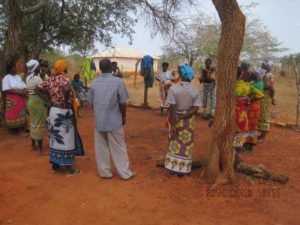
- Respect and promotion of indigenous African knowledge on the farming, care-giving and community development
- Equality for all: God made all people equal; our organization is committed to a development process that promotes equality.
- Rights and dignity for all: We believe in and strive to uphold the rights and dignity of all people especially in the rural communities.
- Stewardship: We believe in God to protect the dignity of everybody to exploit the Earthy goods in accordance with God’s Law and individual order.
- Institutional partnership in development: We welcome and respect ongoing International initiatives and national policies to take care and give support to vulnerable children and disadvantaged people fight poverty, ignorance and diseases such as Malaria, Immunisable diseases and HIV/AIDS.
Strategic Priorities and Programs:
- To inculcate in children, youth and women values that promote sustainable livelihoods especially in Agri-business and sustainable use of the environment through setting up an organic demonstration farms and a farmer’s training centre.
- To improve the quality of life of the orphans and vulnerable children by establishing a permanent home, school and health care centre for them.
- To train care givers in care giving skills to enable these children get adequate care, love and support.
- To provide adequate education to these children to make them good citizens and have a better future through good education right from a tender age
- To create awareness to the community and the outside world the need to protect and support the vulnerable children and the orphans as well as protecting their rights.
- To enhance the efficacy of communities in engaging local governance structures (duty bearers) and other community members (right holders) on issues of leadership and good governance.
- Increased citizen participation in the devolved governance structures to enhance accountability and transparency.

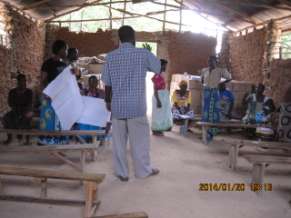
MONITORING AND EVALUATION FRAMEWORK
Magarini Children’s Centre and Demo Farm uses a PARTICIPATORY MONITORING AND EVALUATION process.
A member of the Internal Monitoring and Evaluation Team also visits communities at regular intervals to evaluate the impact of the work as well as the efficacy of the program officers.
When resources are available, at the end of every 3-years, an external evaluator is engaged to evaluate the impact of the work. At the organization level, generally the person responsible for Monitoring and Evaluation is the Monitoring and Evaluation Specialist – A consultant, who is a trained MAGARINI CHILDREN’S CENTRE AND DEMO FARM officer. At the Beneficiary level, a monitoring committee made up of persons from all beneficiary and stakeholder groups and the beneficiary communities are keenly involved.
The monitoring and evaluation session at the community level is chaired by the community contact person and attended by the Monitoring and Evaluation Specialist. The Monitoring and Evaluation Specialist reports to the management team of MAGARINI CHILDREN’S CENTRE AND DEMO FARM from time to time to provide an objective neutral feedback as well as to ensure that the program adheres to the overall goals of the organization. Project monitoring will go on throughout the year to provide continuous feedback that can be immediately ploughed back into the program to correct any shortcomings or to further strengthen it.
This system has been put in place in all project sites and adopted by all monitoring committees at the county level. The feedback is then considered by the project monitoring committee and project design adjusted accordingly in order to make the intervention relevant and effective to the beneficiaries.
In order to lend credibility and validity to Evaluation processes, project beneficiaries have and will continue to play a very vital role. Quarterly monitoring sessions between the Monitoring and Evaluation Specialist and the Field Team are held. The community contact persons have become an integral part of the evaluation system that is continuously being revisited and improved. The fact that they are resident in the target areas means that they have an ear on the ground. They are able to gather both quantitative and qualitative information on project implementation. They have been charged with the responsibility to periodically communicate feedback to the project team. They are able to sense the mood and detect the attitudes and feelings of the beneficiaries. A Peer Evaluation Team will be set up at the county level so as to give an objective angle to the evaluation process and also make it affordable given the limited resources.

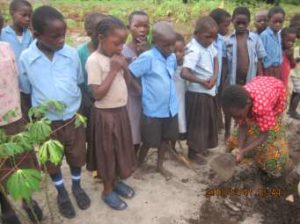
For the children, learning by doing is the order of the day.
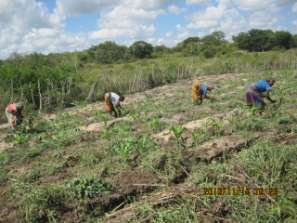
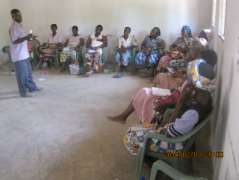

We have large farmland available, Women regularly attend capacity building sessions at the centre, Women in a focus group session.
THE FOUNDERS STORY
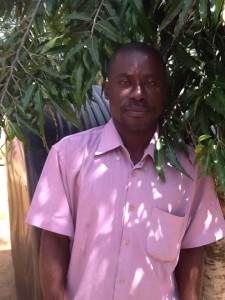 “As a farmer I started the project by providing food for children who missed school because they did not have food at home. As a result, the children left their own homes to fend for themselves – basically looking for wild fruits from the nearby bushes and forest. The problem of hunger was very widespread in the community. These were mostly children from the neighborhood who I would see playing under the cashew nut trees near my farm. Their plight touched my heart so I began giving them food and gathering them together to teach them as much as I could given my busy schedule as a subsistence farmer.
“As a farmer I started the project by providing food for children who missed school because they did not have food at home. As a result, the children left their own homes to fend for themselves – basically looking for wild fruits from the nearby bushes and forest. The problem of hunger was very widespread in the community. These were mostly children from the neighborhood who I would see playing under the cashew nut trees near my farm. Their plight touched my heart so I began giving them food and gathering them together to teach them as much as I could given my busy schedule as a subsistence farmer.
The number of children who did not go to school was increasing so rapidly that I really got concerned. Most of the children who did not go to school were orphans who were left without care and protection after either both or one of their parents died. The extended family system, which was expected to take care of these children, was fast crumbling due to pressures of modern-day living that no longer could sustain the reality of large families living together. Families were breaking into smaller units and most young people were moving away to nearby towns to seek employment, in a bid to deal with the increasing poverty levels at the village level.
This state of affairs saddened my heart so much that I decided on my own to mobilize the children and bring them together to give them love and find ways of restoring their hope by providing them with the very basic needs including education and protection. This was the birth of Magarini Orphan Care Initiative. I particularly fought for the girls in the community for they face greater challenges compared to the boy children. The community practices early forced marriages, so the girl child is indeed an endangered species among the Giriama. I am working tirelessly to ensure that girls are given equal opportunity in education just like the boys, as the community gives first priority to the boy child.
I purchased about 8 acres of land and donated the land to the children. At present the organization provides a home for 120 children, 40 of whom are orphans and the remaining (80) are vulnerable and marginalized children whose parents live in extreme poverty and exclusion in the community. Thanks to this initiative, all the children in the program can now access education, care, protection and have new hope for their life.We have created an environment where children can grow and live to their fullest potential. The project is run by volunteers from the community and the children themselves are very active in learning sustainable ways of growing food and caring for each other. In essence the Magarini Orphan Care Initiative is quickly redefining how people should live together.
This is my definition of LOVE.” – Emmanuel Karisa Baya, July 2014
